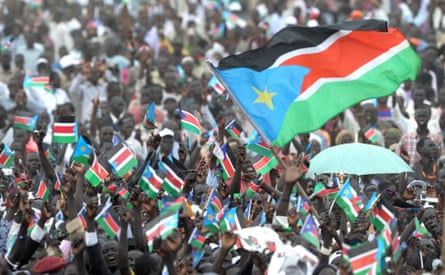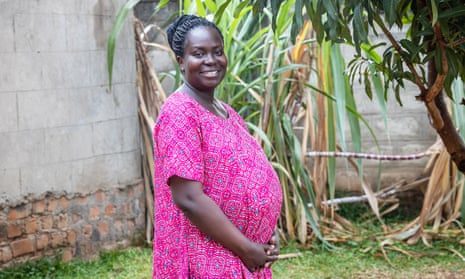When Gloria Soma left university in Tanzania in 2013, she decided to head for the homeland she had never really known. Her parents had left southern Sudan in the early 1990s and she had grown up in refugee camps overseas, first in Uganda during the “hard times” of the Lord’s Resistance Army, and then in Kenya. While she was immersed in her studies, the Republic of South Sudan was born, the 193rd country to join the UN. And she wanted to go.
“It was quite exciting for me because I thought that … I would go back and there were going to be many opportunities and it would be a peaceful place for everyone to live in,” says Soma. “There was already some sense of belonging. Because, as much as I had stayed most of my life in the east African region, there’d always been [the question of] ‘where do you belong?’ There was that bit of me [that felt] ‘finally, we are going to belong somewhere’. But it didn’t happen.”
Ten years ago on Friday, on a hot and heady day, tens of thousands of people gathered in the city of Juba alongside foreign dignitaries and the UN secretary general to watch the flag of Sudan being lowered and the flag of South Sudan raised. Dressed in his trademark black cowboy hat, Salva Kiir, former rebel leader turned politician, was sworn in as president. A man dressed as the Statue of Liberty held a sign that read: “Free at last. Republic of South Sudan.”
Except, as Soma says, it didn’t quite work out like that.

The decade that followed independence has been dominated by civil war and human rights abuses on a vast scale, to the point that a member of the UN commission on human rights in South Sudan said in 2019: “Impunity is so entrenched in South Sudan that every kind of norm is broken.” The war, which raged from 2013 until 2018, has now given way to a fragile peace marred by bouts of conflict, economic crisis and an uneasy sense of permanent instability.
Soma says: “One of my greatest fears living in South Sudan is that you mentally have to prepare your head that any moment, any time, anything could go wrong. I don’t feel safe … There’s always that sense of fear.”
Soma, 32, is director of the Titi Foundation, a Juba-based NGO focused on women and children in a country where one in 10 infants are not expected to reach their fifth birthday, where sexual violence against women and girls is endemic, and where, this year, 1.4 million children are expected to suffer acute malnutrition, the highest number since 2013. So there is no shortage of work.
More than 70% of the Titi staff are women, the result of a deliberate strategy that Soma longs to see replicated across society and at the highest echelons of political leadership. “Women in South Sudan, for a very long time, have been marginalised and thought to be second-class citizens who cannot deliver,” she says, arguing that this attitude is not only wrong but is holding the country back: “It leaves out ideas for innovations that women would have brought to the table if given the opportunity.”
The inspiration for setting up Titi came to Soma in 2016, when, as a civil servant at the central bank, she was confronted for the first time with the realities of war. In July of that year, when fighting between troops loyal to Kiir and soldiers who supported the vice-president, Riek Machar, exploded on to the streets of Juba, she opened up her family’s compound to hundreds of women and children to shelter from the violence. Over the next few days she heard their stories: of rape, murder, abduction; of forced displacement on a massive scale; and also, she recalls, of weary, trauma-inured acceptance. “They kept telling us, ‘it’s going to be fine’. We were like, ‘how can it be fine? This is not normal’.”

When she finally ventured out into Juba after a ceasefire “the entire road was basically dead bodies. You just smelled fresh blood. It was crazy for us, because personally I had never witnessed that, but that was the reality.” Soma’s first instinct then was to take her two children and get out of South Sudan. She acknowledges that she is extremely privileged to have been able to leave the country.
But after three months in Kampala, Uganda, she began to feel uneasy. “I was just not comfortable with what I’d left behind. And that was what triggered me. I said, you know what? I’m going to go back and I’m hoping I will be able to contribute in my own little way. And that’s how the foundation started.”
As her country faces a tangle of interrelated problems, from climate crisis and Covid to resurgent conflict and, in some places, near-famine, Soma is determined to push on. Through Titi she is able to tackle a range of issues, from basic humanitarian needs, such as food insecurity and child nutrition, to more ambitious projects to reduce gender-based violence and boost female employment. Titi’s efforts to help women maintain hygiene amid the pandemic – through supplies of food, soap and clean water – are supported by Cafod.
But her sense of frustration with the national political leadership and the international community is palpable; the former for so completely squandering the hopes of 2011, and the latter for not doing enough to prevent it.
As South Sudan moves fitfully towards peace, it needs to embark on a process of healing, she says, to confront the trauma that exists in people’s consciousness. At the moment there is nowhere near enough accountability for any healing, she warns, citing the example of Bentiu, the capital of Northern Liech state, where in 2018 Médecins Sans Frontières reported that 125 women and girls were raped in a 10-day frenzy of violence. Survivors also reported being whipped, beaten and clubbed with rifle butts. Local officials disputed the accounts, and according to Soma no one has been convicted.
“To this date we have challenges ensuring that these individuals get justice,” she says, speaking from Kampala where she is on maternity leave, expecting her fourth child. “We need some kind of a ‘safe hub’ where these [survivors] can come out into the open and have the conversation.”

The scourge of sexual violence is still ever-present, she says. The Titi Foundation is now working with other women’s rights organisations to push for more prosecutions of those accused of abuses against women and girls. “Yes, it has been a slow process,” she says, “but since 2018 to date we’ve been able to follow up on such cases and [convict] about 56 perpetrators. Our target is to prosecute about 500, so that people get to see the realities and the degree of atrocities committed. Our hope is that by doing this we’re also able to bring in some peace of mind for the victims.”
Does she retain any hope for the future of her country, which in its short life has seen so much suffering? The answer is a very qualified “yes”. “I’m optimistic,” she says, “but only if we begin having everyone accommodated within these spaces to have conversations. We need people to heal in order for us to move forward. Unfortunately, at the moment everything is quite fractured … So how does that get to be healed? How do we rectify such mistakes that the current leadership has created? It’s going to take some time, in my opinion a very long time, before that can happen.”
